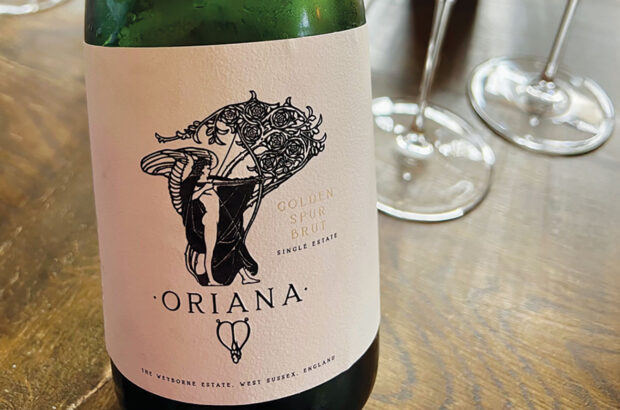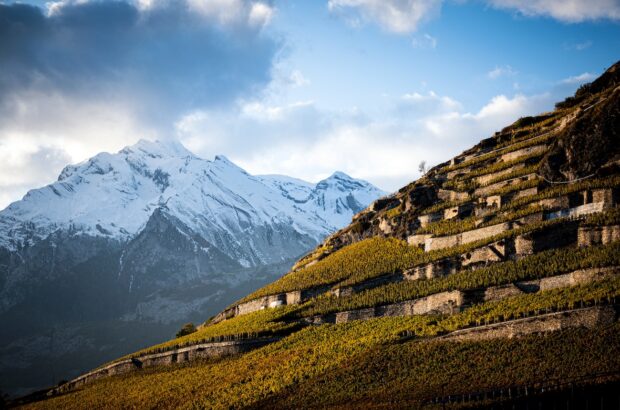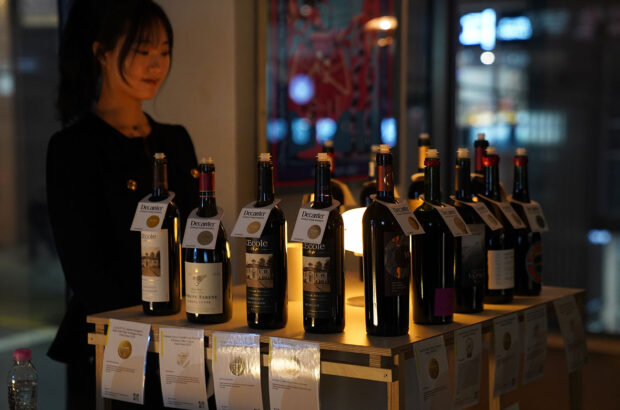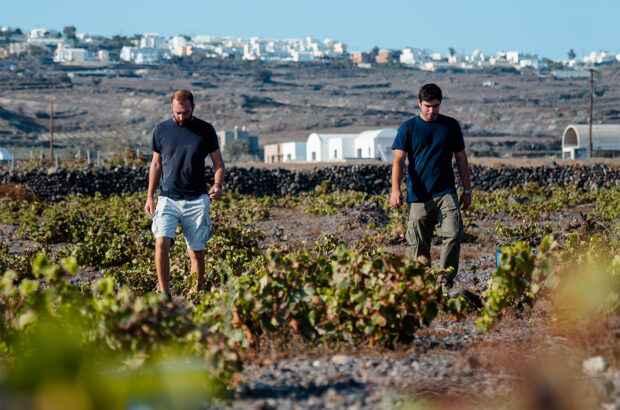He’s making one of the world’s most coveted wines, under the watchful eye of his predecessor – his father. Jane Anson meets Olivier Berrouet
Olivier Berrouet may not have realised that answering fan mail would be part of his remit
when taking over from his father Jean-Claude at Pétrus. But then running this small Pomerol estate (just 11.5 hectares and unchanged in size for more than 40 years) isn’t your average winemaking job.
An unclassified Bordeaux, Pétrus is just a few Cabernet Franc vines away from being 100% Merlot, and has no physical château on the estate. Barely on the radar before 1945, today it
is an undisputed icon; heard of by many, tasted by very few. With prices reaching into the thousands (a bottle of Pétrus 2005 would today cost you around £2,800), Berrouet’s job is
easily one of the most coveted in wine – and one of the most daunting for a then 29-year-old who had no previous experience of the property before taking over in January 2008.
‘I never dreamed of taking over Pétrus. When it was suggested that I did, it was a great surprise; there was no sense of entitlement.’ He may not have worked at Pétrus, but he was just 500m down the road at another iconic Right Bank château, Cheval Blanc, working alongside Pierre Lurton. ‘The terroir is different, the blend of grapes is different, but the philosophy and continual search for excellence is the same. And I’m very lucky to have the wisdom of my father alongside me.
‘It was slightly daunting. But I don’t think about what a bottle of Pétrus means while I’m making the wine, more about what I’m going to put inside the bottle. You have to have a bit of distance when making technical decisions. Of course there’s pressure to make a “worthy Pétrus”, but you need to think clearly, not be overawed. If you aren’t always in the vineyard, and then with the vats, you can miss what’s happening.’ His father nods. ‘When Jean-Pierre Moueix first recruited me, I’d never seen a bottle of Pétrus, let alone drunk one. I was naive, but once I was in the heart of the action, I just got going.
You forget the name of each estate you’re working on, but start instead to have a conversation with it. You can’t think “this is Pétrus, this is Trotanoy”, you focus on what the grapes are telling you. Thank goodness – or how could you do it?’ Preserving the heritage. The Berrouets continue a long history in Bordeaux, not just of châteaux passing down through families, but of winemakers passing their role from father to son – the most famous being Jean-Philippe Delmas taking over from his father Jean-Bernard at Haut-Brion.
Jean-Philippe has spoken about the tensions that can exist between father and son during handover, so this can’t have been the easiest interview for Olivier: to have his first year examined under the eye of his predecessor (and father) – especially one that has cast such a long shadow.
Christian Moueix described Jean-Claude’s contribution to Pétrus as, ‘not only lengthy, but immeasurable’. Indeed, you wonder just how much he has really left. ‘I had great plans for after I retired,’ admits Jean-Claude, ‘but still have no free time, and haven’t done any of the things I intended. I’m just as passionate about Pétrus as ever, and now I can share that with my son. Olivier is living at home, so even if I’m only at Pétrus once a week, over breakfast we talk about the philosophy of viticulture, and how to make a great wine. But it is more a concept than a diktat; Pétrus was here before me, it will be here after Olivier. Our job is to observe, and to maintain what is essential about this vineyard.’ No pressure for Olivier, then…
Pétrus is on the highest point of the Pomerol plateau, at about 40 metres, which allows for natural drainage for the parcels, planted to 95% Merlot and 5% Cabernet Franc. But it is the soil that forms the greatest part of its myth. Very different from its neighbours (which have more gravel and sand), the clay here is particularly uniform, in a band of around 70cm and containing an unusually high concentration of iron ore and clay minerals known as smectites which are particularly useful for regulating water supply.
The roots only go down this far (60cm to 70cm) which seems shallow, but means that the vines are entirely nourished by this iron-rich band of clay. Both soil and subsoil are well balanced – no excess water stress in hot years, and regulated water supply in wet ones – and contribute to a richness and complexity in the Merlot that produces these lush, unforgettable wines. ‘Merlot on clay finds the classicism of Cabernet Sauvignon on gravel,’ explains Jean-Claude.
The other key to the quality is the age of the vines, which are maintained at an average of 40 years old, and replanted in just one hectare parels every six to nine years. ‘The rootstock does evolve,’ says Olivier, ‘and we do our own massal selection of about 100 vines each year, of which around two-thirds are used. These are taken from our best vines, and have a direct link to our past.’ ‘The idea is to preserve our own heritage,’ adds his father.
‘It is key to us. There is no modern philosophy here, but a sense of value in what we have been given.’ Olivier cuts in at this point, subtly asserting a slight change in approach. ‘Sometimes the word tradition can be misunderstood. It’s not just about tradition, but about seeing what needs to be changed, and what should remain the same.’
Gentle evolution
There are other indications that the regime change has not just been in name only. For a start, Jean-Claude was technical director of all Moueix properties, but Olivier has taken over solely at Pétrus. A Moueix team also worked across all the vineyards, while today Pétrus is run as a separate entity. It has always been owned by Christian Moueix’s brother Jean-François, but previously vinification, marketing and distribution were handled by Christian through Etablissements JP Moueix.
Now Pétrus has its own team, with equipments, building and staff just for the one property. This means Olivier has brought in a team of four full time in the vineyards, one full time in the winery, and François Veyssier (cellar master at Etablissements Moueix), Christian and Jean-Claude as consultants.
‘They [the two brothers] just decided it was a natural time to separate the two, to make things easier for the eventual succession. They are both over 60, and began thinking about their children,’ explains Jean-Claude. Jean-François has two daughters and a son, Jean, who is now working at Duclot, Jean–François’ négociant house.
In the vineyard and cellar, also, there has been some gentle evolution. Besides his time at Cheval Blanc, Olivier did a viticultural degree in Toulouse, the same oenology qualification as his father in Bordeaux, and has worked in an industrial-sized vineyard in Australia that produced 40 million bottles per year. He has also managed stints at Romanée-Conti, Margaux, Haut-Brion, Rémy Martin in Cognac and Silver Oak Cellars in Napa, next to Opus One. He has clearly brought a fresh eye.
The grapes are still vinified in cement tanks, still aged in 50% new oak, still treated as gently as ever. But for the 2009 harvest, Pétrus used a laser-optical sorting machine for the first time. ‘The speed of execution was really wonderful,’ says Jean-Claude, ‘it avoids any risks in the sorting. Olivier has taught me some modern techniques can be useful in the vineyard. After 45 years, it is easy to be used to doing things in a certain way – but when you are young you have enthusiasm, you question everything. It has made me feel young again to have him here.’
‘Pétrus has its own style, aroma and quality of tannins,’ says Olivier, pleased by what his father has said. ‘It’s not quantifiable, not measurable. I’m not looking for things you can find anywhere, such as over-fruit or over-extraction. The best wines express where they come from – and my father has taught me the patience and the need for hard work that allow them to do that. Above all, he’s taught me to take pleasure in my work.
Written by Jane Anson






